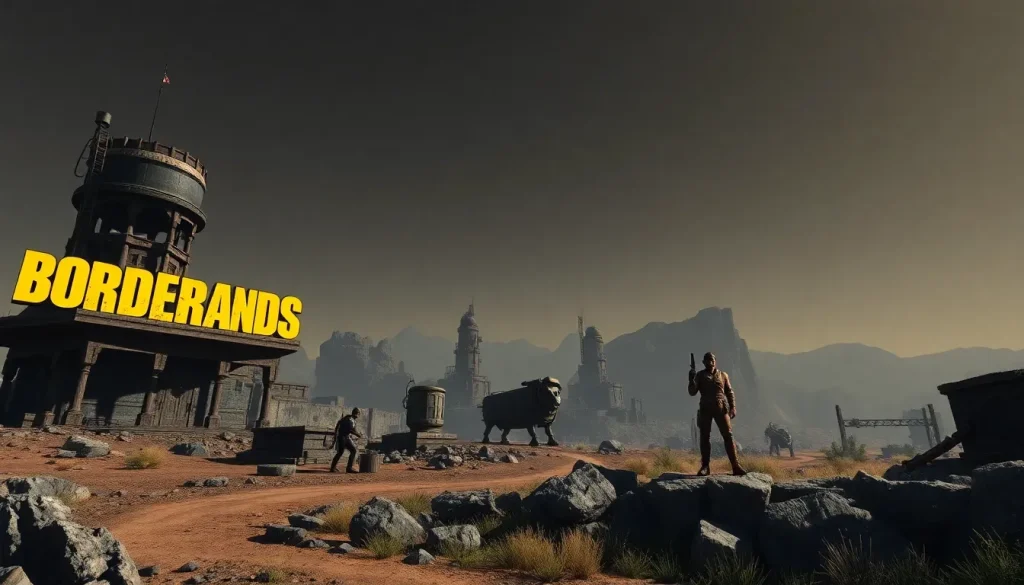Borderlands Boss Claims Gaming Has Yet to Create a Masterpiece

The gaming industry has seen a remarkable evolution over the past few decades, yet some industry figures continue to push the boundaries of what defines a true masterpiece in gaming. Recently, Randy Pitchford, the founder of Gearbox Software, sparked conversation during an interview about the current state of video games and their artistic merit. His statements open up a dialogue about the future of gaming and its place within the broader landscape of entertainment.
In a detailed discussion with Shacknews, Pitchford shared insights into the production of Borderlands 4, the studio's latest installment released on September 12. As the conversation unfolded, he made a bold claim: the gaming industry is still in its infancy and has yet to produce a single masterpiece comparable to monumental works in film, such as Orson Welles' Citizen Kane.
The Complexity of Modern Game Development
Creating a game like Borderlands 4 requires a substantial investment. According to Pitchford, it takes a massive team of hundreds of individuals years to bring such a project to fruition. This level of commitment translates into financial stakes that surpass those of blockbuster films.
Pitchford elaborated on the intricacies involved in game development, stating:
“Making a game requires a commitment from everyone involved. It’s not just about having the funds; it’s about believing that the vision is worth the investment of time and resources.”
This statement emphasizes the delicate balance between creative vision and financial realities. For a project to move forward, all members of the team must share a collective understanding of the project's value and potential impact. The following elements are crucial in this collaborative process:
- Shared Vision: Everyone must believe in the game's concept.
- Resource Commitment: Significant resources must be allocated wisely.
- Value Assessment: There must be a clear understanding of what the game could mean for the industry.
Cinematic Comparisons: Gaming vs. Film
Pitchford's reference to Citizen Kane as the benchmark for cinematic masterpieces raises questions about what constitutes a "masterpiece" in gaming. While he asserts that gaming has yet to achieve such a status, many enthusiasts argue otherwise. The first commercial video game, Computer Space, was released over 54 years ago, and since then, numerous titles have shaped the medium into what it is today.
Some gamers contend that iconic titles like The Legend of Zelda: Ocarina of Time, Dark Souls, and The Last of Us have already reached a level of artistic achievement comparable to classical cinema. These games have not only pushed the boundaries of gameplay mechanics but have also delivered intricate narratives that resonate on a personal level with players.
In contrast to Pitchford's viewpoint, the evolution of gaming has arguably outpaced that of film in several key areas:
- Storytelling: Many games now feature complex narratives that rival those of major film productions.
- Player Agency: Interactive storytelling allows players to shape their experiences uniquely.
- Cultural Impact: Game franchises have become cultural phenomena, influencing media and entertainment.
The State of the Gaming Industry
The industry's rapid growth is evident in the increasing investments made by film and television companies to adapt gaming franchises into movies and series. The crossover is no longer one-sided; gaming properties are now sought after for their compelling stories and established fanbases. This shift highlights a recognition of the artistic value inherent in video games.
Pitchford's assertion that the gaming industry hasn't reached its pinnacle may serve to motivate developers and players alike. It calls for continued innovation and creativity, urging the industry to strive for excellence. This perspective aligns with the sentiment that the best is yet to come, and the future holds immense potential for groundbreaking titles that could redefine what a masterpiece means within the realm of gaming.
Industry Reactions and Community Perspectives
Pitchford's comments have not gone unnoticed, as the gaming community has engaged in discussions surrounding his claim. While some share his view that the medium is still maturing, others have pointed out the significant strides that have already been made. The debate draws attention to various factors that contribute to the perception of gaming as an art form:
- Artistic Design: The visual artistry in games has evolved significantly, comparable to traditional art forms.
- Music and Sound Design: Soundtracks and audio effects enhance the immersive experience.
- Emotional Engagement: Games often evoke deep emotional responses from players.
As discussions continue, it's important for the industry to embrace both criticism and praise. This dialogue fosters creativity and inspires developers to push beyond their limits, ultimately leading to innovative experiences that can be celebrated as masterpieces.
For further insights into the impacts of these discussions within the gaming community, you may find this video particularly engaging:
The Future of Gaming: What Lies Ahead
Looking forward, the possibilities within gaming are limitless. The industry is at a crossroads, with emerging technologies such as virtual reality (VR), augmented reality (AR), and artificial intelligence (AI) set to redefine player experiences. As these advancements take hold, the creative potential expands exponentially.
Many industry experts speculate that the next decade will bring forth:
- Immersive Environments: Enhanced realism in game worlds through VR and AR.
- Dynamic Storytelling: AI-driven narratives that adapt based on player choices.
- Community Engagement: Greater integration of player feedback in game development.
As these elements evolve, the debate around what constitutes a masterpiece in gaming will likely continue. However, one thing is certain: the journey of discovery and innovation within the gaming landscape is far from over.




Leave a Reply